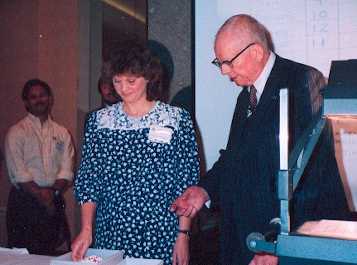FRANCE DEMING |
Association Française Edwards Deming |
think else |
| Our mission | |
| Our mission is to promote an new way of looking at management, economics and education | |
The first time Jean-Marie Gogue met Dr. Deming was October 1978 in Tokyo , and he understood the great importance of his work in Japan. French people know that through the impetus he gave, the French Association for Quality (AFCIQ) created in 1980 "Le Prix Industrie et Qualité", a quality management award. The French prize had modeled itself upon the Deming Prize that the Japanese were considering already as a kind of "Nobel Prize" for management, but that the Western countries still were ignoring. At the invitation of AFCIQ, Deming came to Paris in november 1980 and presented the award in front of an audience of a thousand people, including the CEO's of many top ranking companies. The next day, Deming gave a lecture in front of a hundred high officials at the "Institut de l'Entreprise" about the management system that he taught in Japan. |
|
Deming had been known for a long time in Europe as a specialist of Statistics, a former member of the Census Bureau, one of the men who invented the sampling methods before the Second World War. During the 50's he gave lectures on Statistics at the universities of Kiel, Nuremberg and Frankfurt, and later on at the Institute of Statistics of the Paris University. But until 1980 the Western CEO's were not aware that he was the main advisor of the Japanese CEO's. By that time, Jean-Marie Gogue had started working with Deming and giving his own seminars in Europe. The AFED was founded eight years later. The idea that Deming is a "quality specialist" has spread. During his seminars, he carefully cleared up this wrong idea by saying that his goal was to teach good management practices. He explained that improving quality was mandatory in order to reduce costs, get a better place in the market, provide dividends and create jobs. According to him, quality was essentially the answer to a problem. |
 |
| Dr. Deming and the Red Beads Experiment | |
By the way, the goal of this association is not to study new quality techniques but to implement the management theory designed by Deming. This theory is questioning the working process and the system of performance appraisal. In the long term, our way of thinking aims at a social transformation consisting in more humane working conditions and harmonious economic growth. The first characteristic of the deming philosophy is the leader's obligation to view his/her organization as a system (it is the systemic approach). The methods that we recommend give opportunity to go deeper in the study of the organization's goals, to know the links between the various components and to measure the effects of any action from outside. They make management more effective. The second one is the ability of the decision-maker to read information and data in terms of variations. It is essential to distinguish between two kinds of variation causes: the common causes, that belong to the system, and the special causes, the only ones that can be assigned to an individual or a particular event. The former are by far the most numerous. Confusing the two kinds of variation causes is the principal source of the financial losses that poor management brings about. We learn to prepare all our decisions through the study of variations. The third one consists in always taking psychology into account in company management. An especially difficult problem is the employees motivation. We recommend methods that help natural sources of motivation because they prove to be more effective than artificial ones, i.e. bonuses and all kinds of incentives. Another major problem is fear at all company levels, which is the main cause of witholding information and altering data. We recommend methods that aim at driving out fear. Another problem is stress. We distinguish between two kinds of stress: good and bad. The former lets people work toward the companies' goals; on the contrary the latter paralyzes them. The methods that we recommend favour the good stress. With the passing of time, we can state that the companies and organizations that put this new management system into practice and apply the Deming's 14 points make great progress in terms of profit, innovation and growth. |
|